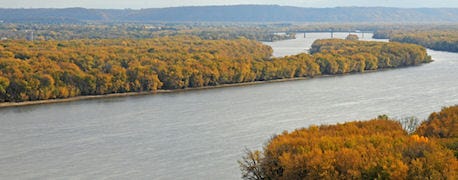
The Iowa Environmental Council has joined with other nonprofit groups in a lawsuit against the federal Environmental Protection Agency and the state of Iowa, contending the EPA and the state haven't done enough to keep fertilizer runoff out of the Mississippi River and the Gulf of Mexico. The Iowa Environmental Council made the announcement March 14, 2012 saying EPA is required to set limits on nitrogen and phosphorus, which contribute to hypoxia or a "dead zone" in the Gulf waters.

Iowa Group Sues EPA Over Nutrient Runoff
The pollution not only fouls Iowa waterways, but also contributes to the largely lifeless dead zone roughly the size of the state of Massachusetts each summer in the Gulf of Mexico, a prime fishing and shrimp producing area. The groups contend in the lawsuit that EPA is required to set numerical limits on the pollutants according to the federal Clean Water Act. Both nitrogen and phosphorus occur naturally and are also key ingredients in fertilizer for crops, lawns and golf courses. Some of the pollution is also coming from sewage treatment plants.
The lawsuit is in response to a 2011 decision by EPA to reject the environmental group's 2008 petition seeking to force EPA to set the standards. EPA acknowledges the pollution is a serious issue but says it has relied largely on states to take action. Officials of the agencies involved in Iowa and those in other states say they are waiting for EPA to set firm guidelines before acting.
Environmental groups say EPA and state agencies aren't doing their job
"This is a huge, multistate problem but EPA hasn't accepted its responsibility for leadership on this issue, and state responses, including Iowa's, have languished as a result," says Marian Riggs Gelb, executive director of the Iowa Environmental Council. "In addition to the Gulf dead zone, excessive amounts of nitrogen and phosphorous from farm runoff and sewage treatment plants cause problems here in Iowa as well, threatening drinking water, recreation in lakes and rivers, and aquatic life here and downstream."
The pollutants carried by the Mississippi River to the Gulf cause algae blooms that deplete oxygen levels in the water as the algae die. Iowa has spent the last three years writing rules to limit the pollution in its lakes and waterways. None have been enacted.
Bill Ehm, Iowa Department of Natural Resources' environmental protection chief, is working with Iowa agriculture secretary Bill Northey and Iowa State University scientists to come up with a strategy to cut the pollution, largely by using voluntary efforts. ISU is studying which farming techniques are most effective at reducing the pollution, and that information could help boost federal aid for conservation practices to be put on the land and for water quality protection work.
Iowa DNR and Iowa Department of Ag are developing a plan to reduce pollution
Ehm says the state still plans to set standards, although no timetable has been set yet. "I don't think we should just give up and say it's unachievable," says Ehm. "The strategy we come up with will tell us what we can do now."
The environmental groups, in addition to the Iowa Environmental Council, include the Natural Resources Defense Council and Sierra Club. They contend EPA's rejection of the petition was a violation of federal administrative rules. They want the limits to reduce pollution in the Gulf where depleted oxygen levels in the water has been linked to nutrient runoff from 31 states, including Iowa.
Studies by the U.S. Geological Survey show Iowa and Illinois are the two biggest sources of nutrient pollution, largely because they are the biggest corn growers. The USGS says Iowa, Illinois and seven other states account for 75% of the fertilizer pollution entering the Gulf.
Farm groups support voluntary approach to solving nutrient runoff problem
Farm groups such as the Iowa Farm Bureau and the state's corn and soybean grower organizations support voluntary efforts to solve the problem. They point out that farmers want to keep their fields from eroding and they want to keep costly fertilizer nutrients in the fields and out of the waterways. Farm Bureau has estimated it could cost farmers $600 million a year nationwide to comply with standards the environmental groups want put in place. They also say there isn't a "one size fits all" strategy that will work in all areas, as lakes and rivers differ and the geology varies across the countryside. That makes it difficult to set nationwide standards.
Copies of the legal documents filed as part of this latest action are available at iaenvironment.org/waterQuality/waterquality.php
ABOUT THE IOWA ENVIRONMENTAL COUNCIL: The Iowa Environmental Council actively works in public policy to provide a safe, healthy environment for all Iowans. The Council focuses on public education and coalition building to give Iowans a voice on issues that affect their quality of life and to protect Iowa's natural resources for current and future generations. For more information, visit www.iaenvironment.org.
ABOUT THE MISSISSIPPI RIVER COLLABORATIVE: The Mississippi River Collaborative is a partnership of environmental organizations and legal centers from states bordering the Mississippi River as well as regional and national groups working on issues affecting the Mississippi River and its tributaries. The Collaborative harnesses the resources and expertise of its diverse organizations to comprehensively reduce pollution entering the Mississippi River as well as the Gulf of Mexico. For more information, visit www.msrivercollab.org.
About the Author(s)
You May Also Like




